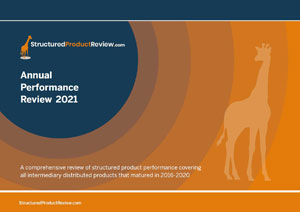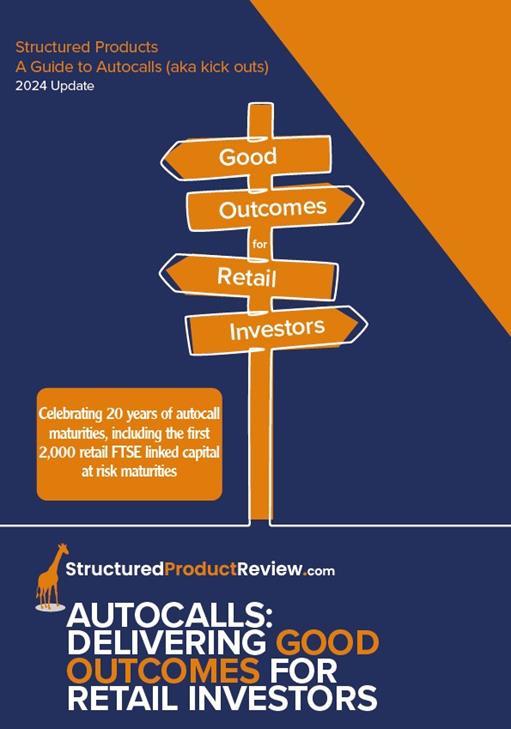Max Darer, Lowes Financial Management, 08/11/2023
November and December are witnessing a host of 6-year maximum term capital at risk autocalls reaching their final observation date. Whilst capital protection barriers are not going to be breached, for these investments it is a case of make, or break as to whether they mature with significant gains, or just a return of capital.
The first week of November saw two such plans return capital only after the FTSE failed to close above the initial index level on each of their annual observation dates including the sixth anniversary.
This brought the total number of FTSE only, capital at risk autocalls to mature without gains in the UK retail space to ten – out of over 1,750 maturities, over two decades. The previous eight commenced just prior to the 2008 financial crisis. For those eight, if their maximum term had been seven years, only one would have failed to produce a gain. Whilst it will be another year before we will know whether this would be the case for the latest two, we certainly know an extra year or two would have been welcome.
The next pair of plans with final observations approaching require the FTSE 100 to be at or above 7,433 and 7,416 on 10th and 13th November respectively. With the FTSE hovering around these levels it’s possible that these plans could still mature positively, provide investors with 6 years’ worth of snowballing coupons – or conversely, just miss out and return original capital only. We remain hopeful that the market can see these through.
The last two plans of the year heading for their final destination are demanding something more of the UK blue chip index; levels of 7,623 and 7,688 on December 28th and 29th will be required for positive outcomes. With a Santa rally this may well be achieved but without such, investors will be facing a return of capital only.
The chart below plots the maturity trigger levels for the four autocalls facing their final maturity this year, together with the two that already reached their end date in November resulting in no gain, and the FTSE 100 index over their duration. As can be seen, over the six-year period the index often came close to the annual maturity triggers points but not close enough.
To us, this accentuates the benefit of extended maximum terms for 7 years or more for autocalls allowing for more opportunities to kick out with a positive result.
We remain hopeful that the market will rally to trigger positive maturities for the remaining four plans but either way, 2023 has now witnessed the first capital at risk FTSE autocalls to not mature positively since 2013.
Structured investments put capital at risk.
Past performance is not indicative of future results.
Also in this section
- How old is too old? Are structured products to die for?
- Product focus - October 2024
- Q3 2024 Issuance
- Q3 2024 maturity results
- A share of spread bets on steroids?
- Product focus - September 2024
- Maturities of the month - August 2024
- Right on time
- Product focus - August 2024
- Keep calm and zoom out
- 2,000 and counting
- Q2 2024 maturity results
- 20 years of autocall maturities
- Product focus - June 2024
- Fixed income or interest?
- Maturities of the month - May 2024
- The barrier debate - revisited
- Product focus - April 2024
- Maturities of the month - April 2024
- Time to call
- I don't believe markets are ever too high for Structured products!
- Notes on counterparty exposure
- Return of Nikkei
- Q1 2024 issuance
- Q1 2024 maturity results
- Structured Products – AAAAAGH!
- Hop in CIBC
- Re-enter Santander
- How to build a financial fortune - revisited
- Issuance in 2023
- Where's the risk?
- Questionable offerings
- Challenging the case against structured products - 'Loss of dividends'
- Navigating the investment landscape
- Challenging the case against structured products - Counterparty risk
- 6-year autocalls approaching final destination
- 1,750 FTSE capital at risk autocall maturities
- The leopard that changed her spots
- Q3 2023
- Challenging the case against structured products - Keydata
- Dilemmas for UK IFA's and the unique role of Structured Products
- 'High charges'
- Precipice bonds
- Intro
- FTSE 100 Contingent Income
- Indexing the indices
- Something different
- Investing through volatility
- 100 10:10s
- The best or worst?
- The 10%/25% 'Rule' that never was
- Structured products and the yield curve
- Fixed income: Capital at risk?
- Prospects for UK inflation - and fun with A.I!
- The Barrier Debate
- More Deposits for now
- Last of the Americans
- What if?
- Time heals all wounds, we hope...
- How to diversify portfolios using structured products?
- The Proof Is In The Pudding...
- Debunking Structured Misconceptions
- 1,500 FTSE Capital-at-Risk Autocall Maturities
- Q3 2022 Maturity Results
- What do we prefer?
- Deposits vs Capital ‘Protected’
- There’s time yet…
- Where did you invest your clients?
- A Six-Month Reflection
- Return of the Rev Con
- Happy 2nd Birthday FTSE CSDI
- Q2 2022 Maturity Results
- The best and worst yet still the best
- Critique my Suitability - Mariana 10:10 Plan June 2022 (Option 2)
- 10/10 for 55 10:10’s
- Q1 2022 Maturity Results
- 'How to build a financial fortune': a follow up
- Critique my Suitability - Mariana 10:10 Plan April 2022 (Option 2)
- 2021 Capital-at-Risk Autocall Maturity Review
- An unwelcome return...
- CSDI's First Birthday
- Bon Anniversaire
- Introducing the FTSE Custom 100 Synthetic 3.5% Fixed Dividend Index
- Q3 2021 Maturity Results
- Critique my Suitability - Mariana 10:10 Plan October 2021 (Option 2)
- Blurring the lines...
- Beware of false knowledge; it is more dangerous than ignorance
- Good news, bad news...
- Certainty is Certainly a Benefit
- Critique my Suitability - Mariana 10:10 Plan September 2021 (Option 2)
- A Twenty-Year Progression
- Q2 2021 Maturity Results
- Nine 8:8s Post Positive Returns in Falling Markets
- Critique my Suitability
- Q1 2021 Maturity Results
- Morgan Stanley’s Marvelous Maturity Medley
Current Products
We review the UK's retail structured investment sector, providing pertinent support for Professional Advisers and relevant research tools.
View all ⟶


